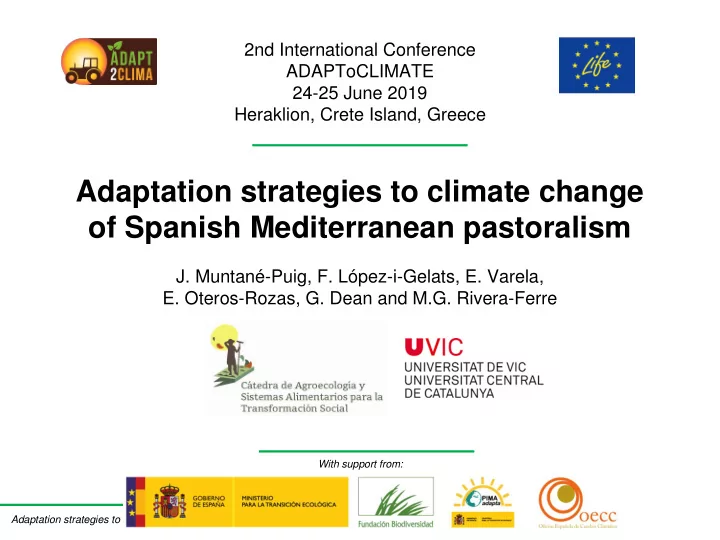

2nd International Conference ADAPToCLIMATE 24-25 June 2019 Heraklion, Crete Island, Greece Adaptation strategies to climate change of Spanish Mediterranean pastoralism J. Muntané-Puig, F. López-i-Gelats, E. Varela, E. Oteros-Rozas, G. Dean and M.G. Rivera-Ferre With support from: Adaptation strategies to climate change of Spanish Mediterranean pastoralism
Outline 1. Research context 2. Objectives 3. Methodology 4. Preliminary results 5. Preliminary conclusions Adaptation strategies to climate change of Spanish Mediterranean pastoralism 2
1. Research context Pastoralism in the world Source: Weber and Horst (2011), in Niamir-Fuller 1999 120 to 190 million of pastoralists (Raas, 2006; ETC, 2009) Practiced on 25% of the global land (UN, 2010) Adaptation strategies to climate change of Spanish Mediterranean pastoralism 3
1. Research context Pastoralism in Spain Map: IGN (2015) Adaptation strategies to climate change of Spanish Mediterranean pastoralism 4
1. Research context Pastoralism / Extensive livestock farming Vulnerability of pastoralism… DROUGHT CHANGES IN SEASONALITY RISING TEMPERATURES LESS SNOW / GLACIER RETREAT SNOWSTORMS STRONG WINDS AND SAND-DUST FLOODS FROST … …2 positions: a) Highly vulnerable to climate-related hazards (dependence on environment) b) Well-equipped to tackle climate variability (ability to adapt to change) – role of climate change and non-climatic drivers Adaptation strategies to climate change of Spanish Mediterranean pastoralism 5
2. Objectives To better understand ongoing transformations of pastoralism in Mediterranean Spain by: 1. Compiling and analysing existing knowledge (climate- and non-climate- related drivers) 2. Examining patterns and trends across different pastoral regions Adaptation strategies to climate change of Spanish Mediterranean pastoralism 6
3. Methodology 1. Literature review (world-wide) – López-i-Gelats et al (2016) 2. Qualitative Comparative Analysis (QCA) • Semi-structured interviews to 25 key informants • Iterative process of coding and re-coding 3. Surveys • Online and in person (113 interviewees) Adaptation strategies to climate change of Spanish Mediterranean pastoralism 7
3. Methodology Vulnerability framework: A. Exposure - Climate related - Non-climate related B. Sensitivity - Effects on pastoralists - Pastoralists’ land conversion C. Adaptation - Strategies - Continuity Adaptation strategies to climate change of Spanish Mediterranean pastoralism 8
4. Preliminary results Adaptation strategies to climate change of Spanish Mediterranean pastoralism 9
4. Preliminary results Some trends concerning exposure : Interviews (QCA) Survey • • More droughts More droughts • • Changes in seasonality Changes in seasonality • Disappearance of wells and sources • Expansion of wild fauna • • Depopulation Depopulation • • Population ageing Population ageing • • Lack of generational replacement Lack of generational replacement • Erosion of traditional knowledge • • Marginalisation in public administration Marginalisation in public administration • • Bureaucracy and legal barriers Lack of understanding of pastoralism • • Tourism expansion Oil price increase • Reduction in total farmed land • Forest encroachment Adaptation strategies to climate change of Spanish Mediterranean pastoralism 10
4. Preliminary results Some trends concerning sensitivity : Interviews (QCA) Survey • Decreasing access to pastures • Decreasing knowledge and use of • traditional practices Decreasing access to water • • Decreasing access to labour Decreasing access to qualified labour • Increasing access to other farmers • Increasing access to digital social networks • Land use change: pastures to abandoned pastures • Land use change: pastures to scrub/forest Adaptation strategies to climate change of Spanish Mediterranean pastoralism 11
4. Preliminary results Some trends concerning adaptation : Interviews (QCA) Survey • • Abandonment of marginal pastures Changes in grazing areas • • Use of migrant labour Use of unpaid family work • Grazing in natural reserves • Frequent use of complementary food • Diversification of farms • • Diversification of income Diversification of income • Changes in animal species • Use of local breeds • Mutual help • • Cooperation for lobbying Organic production • Sale of new products • Improvement in marketing strategies • • Reception of public subsidies Reception of public subsidies Adaptation strategies to climate change of Spanish Mediterranean pastoralism 12
5. Preliminary conclusions 1. Vulnerability of pastoralism in Mediterranean Spain = climate change + external factors 2. Public policies have an important impact on pastoralism 3. Large coincidence in exposure and sensitivity, much smaller in adaptation 4. Diverse strategies of pastoralists suggest large adaptation capacity Adaptation strategies to climate change of Spanish Mediterranean pastoralism 13
Thank you! joaquim.muntane@uvic.cat J. Muntané-Puig, F. López-i-Gelats, E. Varela, E. Oteros-Rozas, G. Dean and M.G. Rivera-Ferre With support from: Adaptation strategies to climate change of Spanish Mediterranean pastoralism
Recommend
More recommend